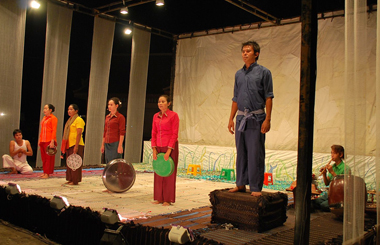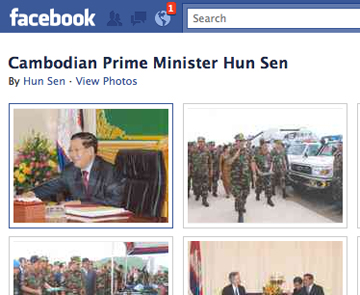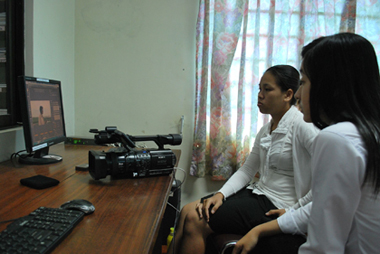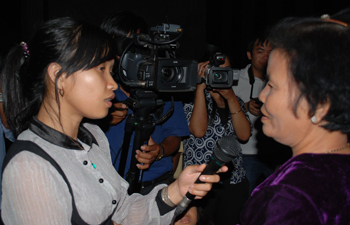PHNOM PENH, CAMBODIA — A blog criticizing Prime Minister Hun Sen and his Cambodian People’s Party (CPP) has been at the center of a recent controversy in Cambodia, shedding light on a deteriorating environment for freedom of expression in the Southeast Asian country. World Food Programme (WFP) employee Seng Kunnaka received a six month sentence for handing out copies of material from the KI Media blog, which came soon after Hun Sen berated the WFP for suggesting that Cambodia is vulnerable to food shortages.
KI Media has been blocked by some ISPs since the dispute, though the government has not formally banned the site. In Phnom Penh last week, the site was available in some places, depending on the ISP, but in others a message appeared saying the web page was unreachable.

Whatever his feelings about KI Media, Hun Sen has long had a tetchy relationship with UN agencies, principally due to tensions over the hybrid Cambodian-international court set up to try the four main surviving Khmer Rouge leaders. The Cambodian government has not shied from confronting the UN, or from seeking the ouster of UN representatives whom are regarded with distaste. The WFP apologized to Hun Sen, an act of contrition which was in turn ridiculed as weak by civil society groups in Cambodia.
Prime Minister on Facebook
Prime Minister Hun Sen has his own Facebook page, with more than 4,000 friends at last look, as well as a website and blog. Twitter and Facebook were described as playing a key role in the Tunisia and Egypt uprisings earlier this year, but Hun Sen is adamant that there is no parallel between North Africa and his country, despite recent lags in political freedom and freedom of expression in Cambodia.

He may be right, in a cynical sense, given that Internet access is growing in Cambodia, but is mostly limited to urban areas and to the population literate in English or other foreign languages, meaning a new media-sparked uprising is less likely in Cambodia than elsewhere. That said, the government claims there are almost 10 million mobiles phones in use in Cambodia, a 64% ownership rate that puts the country above China and India. Statistics from the International Telecommunications Union (ITU) show that there are 16 ISPs and 10 mobile phone operators in Cambodia, but for the most part Internet access averages a pricey 2000 riel (about 50 cents U.S.) per hour, in a country where GDP per capita is a flat $2,000 (U.S. dollars), according to U.S. Government statistcs.
There are 247,000 Facebook accounts in Cambodia, according to socialbakers.com, or about 1.68% of the population. In contrast, 22% of the population of the Philippines — almost 23 million people — uses Facebook. It’s a neighboring country with an annual average per capita income of $3,500 (U.S. dollars). Part of the disparity is due to the Philippines being an Anglophone country, while most Cambodians speak only Khmer. Rendering Khmer script into a viable unicode for online reading has proven a challenge and is holding back online access for ordinary Cambodians.
Between ‘Cloggers’ and Farmers
Traditional media in Cambodia is constrained. Heng Long is a former Xinhua reporter and now affiliated to the Cambodian Association for Protection of Journalists (CAPJ), a partner organization of the Southeast Asia Press Alliance (SEAPA).
“Cambodian TV is all about entertainment. There is no real news and certainly no analysis,” Long told me, adding that radio is somewhat better. There are opposition voices, but these are often partisan, leaning toward the Sam Rainsy Party, the main, albeit circumscribed, opposition party in Parliament, rather than being neutral or independent.
Self-censorship is prevalent among Cambodian journalists, though there is some aggressive print media reportage of corruption and crime. However fears of lawsuits and intimidation have a chilling impact. The country’s media laws are complex and contradictory when weighed against the Constitutionally enshrined freedom of expression, and, to cite one example, Article 13 of the press law prohibits the media from publishing “false information that humiliates or is in contempt of national institutions.”
Sopheap Chak is a self-described ‘clogger’ (Cambodian blogger) who kindly spared some time to talk to me on her 26th birthday. She said that most of the media in Cambodia is linked to or controlled by the CPP, particularly television.
“The English language newspapers (namely the Phnom Penh Post and Cambodia Daily) are unrestricted,” she said, “as the government knows that the reach and impact of such newspapers is not widespread.”
Radio has the widest reach, and is often the sole media or news outlet in rural areas.
“Human rights groups have plenty of success in getting research discussed on radio,” she added.
However newspapers have limited reach outside the cities.
“Most people in the country cannot afford to buy Khmer papers,” says Heng Long, “and after working hard on the farm many just want to relax in the evening with the radio or the TV, if they have one.”
School’s almost out

Even if new media can expand in Cambodia, an additional and pre-existing hurdle will have to be addressed if the country is to improve its overall media environment. Training journalists is a challenge in Cambodia, with the country’s main training center — the Department of Media and Communications (DMC) at the Royal University of Phnom Penh (RUPP) — struggling with reduced funding.
“The course is taught in English, it is the first and only one of its kind in the country, and 100% of our graduates get a job”, said Vichea S. Tieng, acting DMC head, in an interview at his office. “However we are reliant on Konrad Adenauer Stiftung [a German political foundation] for funding,” he says.
On a more hopeful note, some of RUPP’s media students appear to have some of journalism’s more noble objectives in mind. Taking a few minutes from editing her final year video news project, Sokun (who asked that her full name not be used) said she wants work as a TV producer. “Media is a powerful tool to change society,” she said, “that is why I decided to do this work.”
All photos by Simon Roughneen
Simon Roughneen is an Irish journalist usually based in southeast Asia. He writes for Los Angeles Times, Asia Times, The Irrawaddy, ISN, South China Morning Post and others. He is a radio correspondent affiliated to Global Radio News and has reported for RTÉ, BBC, CBS, CBC Canada, Fox News, and Voice of America. He has worked in and reported from over 30 countries.

